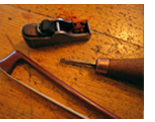Our Mission |
IPCI USA's mission is to promote the science-based conservation, replanting and sustainable use of pernambuco, which is so precious
in nature and to stringed-instrument music, so that it will flourish
for many generations to come. |
|
Who We Are |
 
branches in the USA, Germany and France
that work together to plan and implement
IPCI's program. A fourth IPCI organization, IPCI-Canada, is helping to build awareness and raise funds for IPCI's activities.
IPCI was formed in May 2000, after an international group of bow makers came together out of concern for the widespread destruction of the Atlantic Rainforest of Brazil, the world's only habitat for pernambuco. From the beginning, IPCI's goal was to work in partnership with like-minded Brazilian counterparts to increase scientific knowledge about pernambuco and to promote its replanting and conservation.
In 2001, IPCI contacted the Comissao Executiva do Plano da Lavoura Cacaueira (CEPLAC), a Brazilian government agro-forestry agency focused on cacao. Following extensive discussions IPCI formed a partnership with CEPLAC to create the Programa Pau-Brasil, a science-based project to work with local cacao farmers and landless community members to replant pernambuco in Bahia, Brazil. For more details about IPCI's program click here.
IPCI's work is primarily sustained by the contributions of its diverse membership, which includes musicians, music lovers, teachers, stringed-instrument makers and conservationists. Roughly one-third of IPCI's members are bow makers, artisans who are carrying out a craft passed on from master to apprentice for centuries. Working with hand tools such as tiny planes, knives and chisels, they make the bows used by professional players of stringed musical instruments worldwide. close |
|